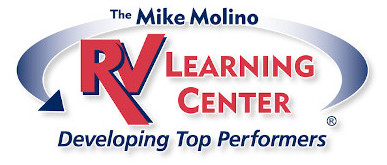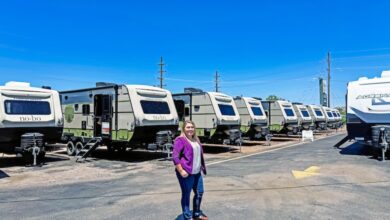Mastering the Art of RV Towing: A Guide for Technicians
Tips for ensuring safe towing as well as addressing customer concerns and common issues.
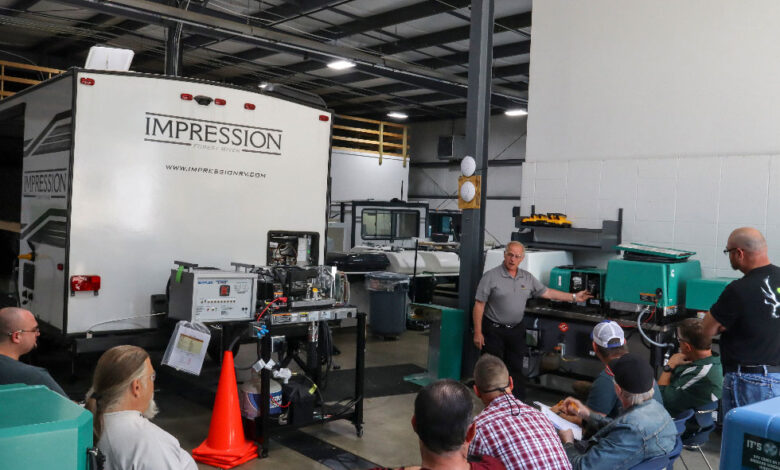
Towing an RV is more than just hitching up and hitting the road. It’s a complex interplay of weights, equipment and driving conditions, and RV technicians play a crucial role in ensuring customer safety and peace of mind. This article delves into the essential knowledge RV technicians need regarding towing and hitches, addressing common customer concerns, prevalent issues and the top five key takeaways for safe and successful RV towing.
The Foundation of Safe Towing: Understanding Weights & Equipment
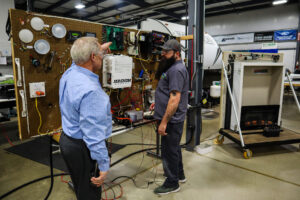 Successful towing hinges on a thorough understanding of the weights and capacities of all involved components — the tow vehicle, the trailer and the hitching equipment. Technicians must be well-versed in these specifications to guide customers effectively. This includes understanding gross vehicle weight rating (GVWR), gross combined weight rating (GCWR), tongue weight and payload capacity. Explaining these concepts clearly to customers is paramount. Furthermore, technicians need to be familiar with the various types of hitches, their weight ratings and their compatibility with different tow vehicles and trailers. This knowledge is the bedrock of safe towing practices.
Successful towing hinges on a thorough understanding of the weights and capacities of all involved components — the tow vehicle, the trailer and the hitching equipment. Technicians must be well-versed in these specifications to guide customers effectively. This includes understanding gross vehicle weight rating (GVWR), gross combined weight rating (GCWR), tongue weight and payload capacity. Explaining these concepts clearly to customers is paramount. Furthermore, technicians need to be familiar with the various types of hitches, their weight ratings and their compatibility with different tow vehicles and trailers. This knowledge is the bedrock of safe towing practices.
The Perils of Trailer Sway: A Technician’s Guide to Prevention
Trailer sway, also known as “fishtailing,” is a dangerous phenomenon that can quickly lead to loss of control. Technicians should be experts in identifying the causes of sway and advising customers on preventative measures.
Several factors contribute to trailer sway:
- Wind: Gusts of wind, especially crosswinds and the “bow wave” from passing trucks, can exert significant force on the trailer, initiating sway.
- Uneven Road Conditions: Bumpy roads, potholes and construction zones can exacerbate trailer movement and make sway more likely.
- Poor Driving Conditions: Rain, snow and ice reduce traction and increase the risk of sway. Hydroplaning can be a significant concern.
- Improper Weight Distribution: Uneven loading, with too much weight at the rear of the trailer, is a primary cause of sway. The tongue weight should ideally be 10% to 15% of the total trailer weight.
- Overloading: Exceeding the weight ratings of the tow vehicle or trailer puts undue stress on the equipment and significantly increases the risk of sway.
Technician’s Toolkit: Addressing Customer Concerns & Common Issues
RV technicians are often the first point of contact for customers with towing-related questions and problems. Here are some common issues technicians encounter and how to address them:
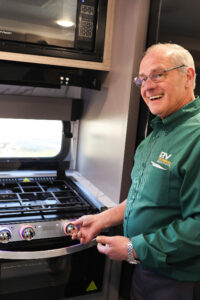 “My trailer sways — what can I do?” This is a frequent complaint. Technicians should first assess the customer’s setup, checking weight distribution, hitch type and tire pressures. They should then explain the causes of sway and recommend solutions, such as a weight distribution hitch with sway control, adjustments to loading or upgrading tires.
“My trailer sways — what can I do?” This is a frequent complaint. Technicians should first assess the customer’s setup, checking weight distribution, hitch type and tire pressures. They should then explain the causes of sway and recommend solutions, such as a weight distribution hitch with sway control, adjustments to loading or upgrading tires.- “What kind of hitch do I need?” Technicians should guide customers through the selection process, considering the weight of the trailer, the tow vehicle’s capabilities and the type of towing they plan to do. They should explain the differences between weight-carrying and weight-distributing hitches.
- “How do I know if my trailer is loaded correctly?” Technicians should educate customers on the importance of proper weight distribution and demonstrate how to calculate tongue weight. They can also recommend tools like tongue weight scales.
- “My lights aren’t working.” Trailer lights are essential for safety. Technicians should be able to diagnose and repair trailer wiring issues, including checking connections, fuses and bulbs.
- “My brakes aren’t working.” Trailer brakes are crucial for stopping safely. Technicians should be knowledgeable about different types of trailer brakes (electric, surge) and be able to diagnose and repair brake malfunctions.
Top 5 Things RV Technicians Need To Know About Towing & Hitches:
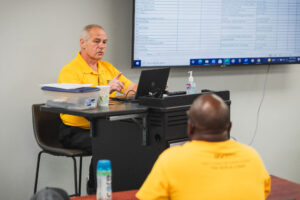 Weight Ratings Are Paramount: Understanding and adhering to weight ratings is the cornerstone of safe towing. Technicians must be able to explain these ratings to customers and help them determine the appropriate setup for their needs.
Weight Ratings Are Paramount: Understanding and adhering to weight ratings is the cornerstone of safe towing. Technicians must be able to explain these ratings to customers and help them determine the appropriate setup for their needs.- Weight Distribution Is Key: Proper weight distribution is critical for preventing trailer sway and ensuring a stable towing experience. Technicians should be proficient in setting up and adjusting weight distribution hitches.
- Sway Control Is Essential: Sway control devices, integrated into weight distribution hitches or as separate components, significantly enhance towing safety. Technicians should be familiar with the different types of sway control systems and their benefits.
- Hitch Selection Matters: Choosing the right hitch is crucial for compatibility and safety. Technicians should be able to recommend the appropriate hitch type and class based on the customer’s towing needs.
- Regular Maintenance Is a Must: Regularly inspecting and maintaining towing equipment is essential for preventing problems. Technicians should advise customers on maintenance schedules and perform thorough inspections during service appointments.
Beyond the Basics: Continuous Learning & Customer Education
The world of RV towing is constantly evolving, with new technologies and best practices emerging. Technicians should stay up to date on these developments through industry publications, training programs and certifications. Furthermore, effective communication with customers is paramount. Technicians should be able to explain complex concepts in a clear and concise manner, empowering customers to make informed decisions about their towing setup. By combining technical expertise with excellent customer service, RV technicians can play a vital role in promoting safe and enjoyable RV adventures.

